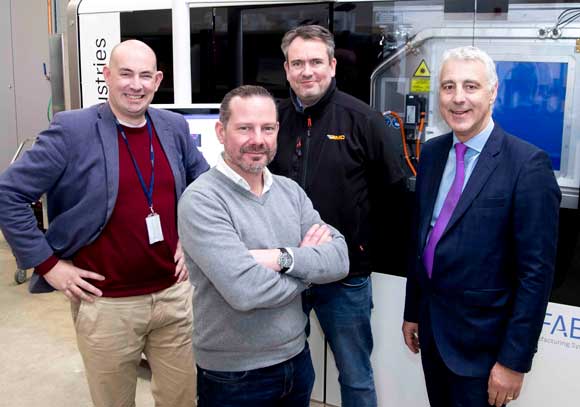DMC and Satellite Applications Catapult partner to advance UK’s space industry
July 11, 2022

The Digital Manufacturing Centre (DMC), Towcester, UK, has entered into a partnership with the Satellite Applications Catapult, a UK-based technology and innovation company, to advance the UK’s space industry by establishing a national space supply chain for advanced manufacturing.
The UK’s space industry currently generates approximately £16.5 billion per annum, providing 47,000 jobs across almost 1,300 different organisations. The UK government has set ambitious targets to develop the space industry and aims to capture 10% of the sector by 2030. Significant growth will be required to reach these targets, specifically the development of a comprehensive and advanced supply chain specialising in high-performance composites and Additive Manufacturing.
DMC is an active supplier of Additive Manufacturing solutions to advanced industries including space, aerospace, defence, motorsport, automotive, energy, and MedTech. The Catapult supports early-stage businesses with technical and commercial advice and access to unique facilities and equipment. It brings together multi-disciplinary teams to generate solutions to some of the space industry’s greatest challenges.
“The UK space sector is expected to undergo significant growth over the next decade,” commented Kieron Salter, CEO of the DMC. “Integral to these ambitions is a highly-capable supply chain that understands the unique challenges of the industry – particularly when it comes to commercial applications – and is able to service those requirements.”
“Additive Manufacturing and the skilled engineering to exploit its limitless production capabilities will play an important role in the future of the space sector. Whether we are making parts on Earth, or creating designs to be printed in orbit, this new partnership signals the Digital Manufacturing Centre’s intention to be a production leader within the commercial UK space sector. In addition to supporting manufacturing for the space industry on Earth, our joint ambition is to have a DMC-led AM capability in space – either in orbit, on the moon, or another planet entirely.”
Additive Manufacturing is said to be a good solution for the challenge of manufacturing in space. Teams are currently on the ground designing and engineering parts and spares that are then transmitted to spacecraft and stations in orbit and manufactured in space using on-board Additive Manufacturing machines.
Both organisations state that they are keen to ensure that the benefits of their joint capabilities can directly support the UK space sector. The new partnership will involve working with organisations developing orbital capabilities and will address one of the key challenges for In-Orbit Servicing & Manufacturing (IOSM); assembly without conventional fasteners. DMC will leverage its experience developing structures for the high-performance automotive sector in combination with the Catapult’s knowledge of IOSM and net-shape manufacturing to create novel and optimised solutions.
Mike Curtis-Rouse, Head of Access to Space at the Satellite Applications Catapult, stated, “Our mission is to help grow the UK space industry on the world stage. Within the UK, we have the engineering skills and manufacturing capability to become an international leader in space technology and applications. Our role is to bridge the gap between industry and academia to deliver viable commercial solutions to the challenges of space ensuring that the right technology is used for the right application.”
“Working closely with the Digital Manufacturing Centre provides us with ready access to highly sought-after skills, expertise, experience and technologies. This new partnership is a statement of intent and a promising signal for the future of the UK space industry and its emerging supply chain. It follows closely from the announcement of our partnership with the Manufacturing Technology Centre earlier this year, and will further strengthen the development of the next generation of technology for the space sector.”
















